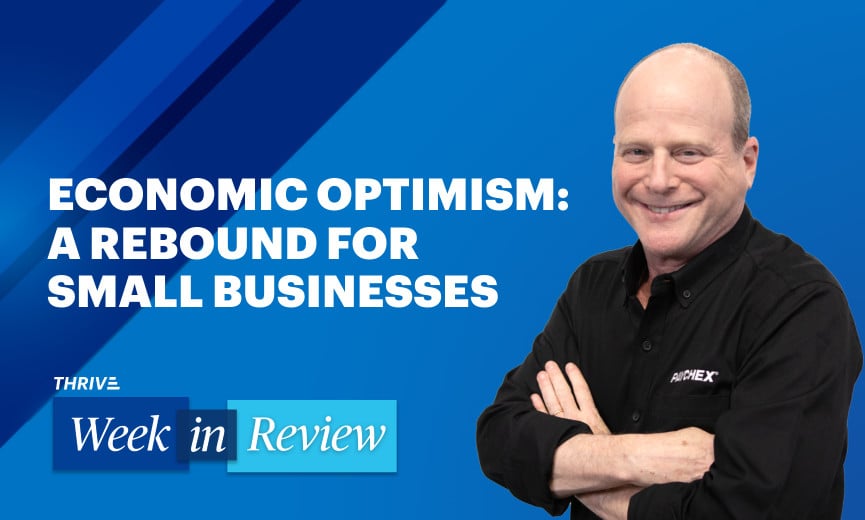- Thrive
-
Temporada
4Episodio200
Las leyes laborales de California, el salario mínimo, las iniciativas electorales sobre la licencia remunerada y la construcción en NJ
Podcast •
Vea
Resumen
California, which tends to set the pace for legislation, has laws on discrimination enforcement and the need for driver’s licenses for employment taking effect in 2025. Gene Marks surveys the national landscape following the elections in this week’s episode, sharing insights on paid leave ballot initiatives in Nebraska and minimum wage hikes in Missouri. He also talks about the billions of dollars available to construction businesses in New Jersey. Tune in for the latest updates.
Ver transcripción
Hey, everybody, and welcome to this week's episode of the Paychex THRIVE Week in Review podcast. This is where we're review certain items, news items that happened during the week and how they affect our businesses. My name is Gene Marks. This week we're going to talk about different things that came about over the past few days, particularly from the election as well, regarding states and a state that you might live in.
If you were a watcher in the state of California, you need to be aware of some new laws reflecting employment that are going to impact your state in 2025. Now, again, if you're not in the state of California, just be aware California usually leads the pack in these kinds of things. So, let's be aware.
This news comes from HRdive.com, and I'm just going to give you three new laws that you should be aware of. The first has to do with local enforcement of discrimination claims. Employers in California can expect to see local governments enforcing certain state nondiscrimination laws. The law allowing them to do so was passed because the state's civil rights department cannot keep up with the volume of complaints being filed. So, no longer will the state be enforcing some of these discrimination laws, but now local authorities are allowed to do that, as well.
The second has to do with intersectional nondiscrimination protections. The concept of this has been recognized elsewhere, such as by the EEOC, but now California has outlawed it at the state level. What does it mean? It means that even if an employee is unable to show age or sex discrimination individually, they could successfully allege bias based on the fact that, say, they're an older woman or they're a woman or they're a person of color. So, even though they don't have to provide documentation or that kind of a proof, obviously, you know, if you can tell and it's obvious that proof is really not necessary.
HR Dive recommends that employees employers revise their policy to anticipate that discrimination can be on the basis of a combination of factors.
The third has to do with driver's license requirements. California has put greater impositions on employers, who try to indicate in their job posting that a driver's license is necessary for the job.
To eliminate potential employment barriers for some workers, the law requires that if an employer indicates that a license is required, it must; one, reasonably expect driving to be one of the job functions for the position; and two, reasonably believe that satisfying the job function via an alternative form of transportation would not be comparable in travel time or cost.
So, three among many changes coming in California laws that affect your employees this year.
Now, let's move elsewhere around the country. Obviously, the presidential election and Congressional elections took big news this past week, but there are a lot of local initiatives that affect people, and particularly employers.
Specifically, I'm going to talk about minimum wages. Voters in Alaska and Missouri greenlit minimum wage increases. By the way, this report also comes from HRdive.com. Alaska's minimum wage will increase to $15 per hour by July 1, 2027, while Missouri's will incrementally increase to $13.75 an hour per year before hitting a $15 per hour by 2026.
The two states were already among 30 states that had minimum wages above the federal minimum wage in the U.S., which as we know, is $7.25.
Also in Nebraska, voters there joined in on the paid sick leave trend. Under the states approved ballot initiative, workers and employers with fewer than 20 employees may accrue and use up to 40 hours of leave per year, while those in employers with 20 or more employees may accrue and use up to 56 hours per year. The leave accrues at a rate of one hour per year for every 30 hours work.
So, this is just three states Nebraska, Missouri, Alaska passing, legislation, increasing either minimum wages or paid sick leave off. So be aware, you might want to check with your attorney to see if any new laws have passed in your states or were approved by voters were coming into effect, in 2025 that impact your business.
Finally, we go all the way to the east in New Jersey. If you're in the construction business in New Jersey, you've got some good news. Construction is booming in New Jersey, so says a forecast. This report comes the New Jersey Business and Industry Association. The New Jersey construction infrastructure scene is booming, creating huge opportunities for businesses, according to industry and government experts who spoke at the Alliance by Actions – Alliance by Action’s recent 40th Annual Construction Forecast, an event in Edison, NJ.
The state is on track to spend a record $576 billion on construction projects over the next two years, a 5.17% increase from last year's forecast. The numbers represent significant growth and optimism for New Jersey's construction industry, said the person – the president – of the New Jersey Alliance for Action.
Some of the big numbers, just say, you know: Utilities are getting 150, sorry, utilities are getting almost $16 billion in capital infrastructure spending. Hospitals, $4.4 billion in expansions and renovations. New Jersey Economic Development Authority $5.6 billion in state-backed projects. Port Authority of New York and New Jersey, $4.2 billion on aviation, tunnels, bridges, and more.
So, public-sector spending on infrastructure booming in New Jersey. If you're in the construction business, hopefully you're going after some of that business, as well, because it seems like an opportunity.
You've been watching and or listening to the Paychex THRIVE Weekend Review podcast. If you want any help or tips to run your business, visit us at paychex.com/thrive and sign up for our newsletter. You'll get a lot of great advice and tips and links to some of the prior episodes of this podcast.
My name is Gene Marks. Thanks for listening or watching. We'll see you again next week. Take care.
This podcast is property of Paychex, Inc. 2024. All rights reserved.

 Apple Podcast
Apple Podcast Spotify
Spotify iHeartRadio
iHeartRadio









